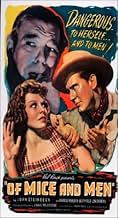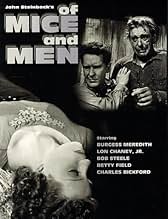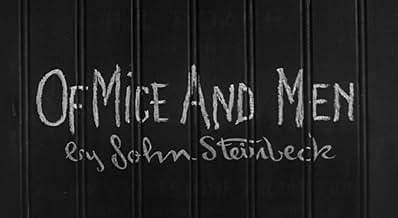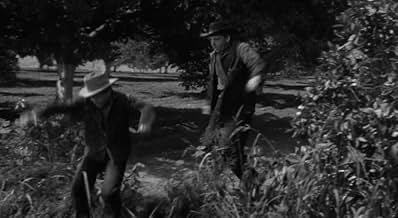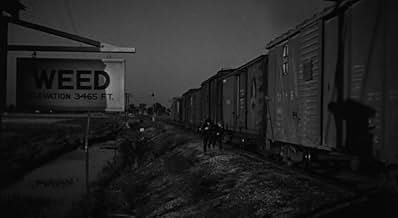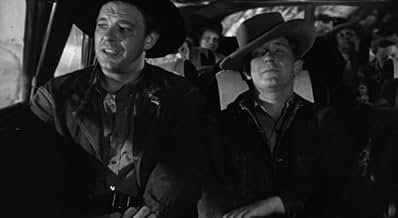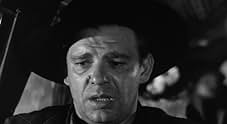IMDb-BEWERTUNG
7,8/10
7236
IHRE BEWERTUNG
Füge eine Handlung in deiner Sprache hinzuA mentally disabled giant and his level headed guardian find work at a sadistic cowboy's ranch in depression era America.A mentally disabled giant and his level headed guardian find work at a sadistic cowboy's ranch in depression era America.A mentally disabled giant and his level headed guardian find work at a sadistic cowboy's ranch in depression era America.
- Für 4 Oscars nominiert
- 5 Gewinne & 4 Nominierungen insgesamt
Henny Backus
- Girl
- (Nicht genannt)
Silver Tip Baker
- Old Hand
- (Nicht genannt)
John Beach
- Ranch Hand
- (Nicht genannt)
Baldwin Cooke
- Ranch Hand
- (Nicht genannt)
Whitney De Rahm
- Ranch Hand
- (Nicht genannt)
Eddie Dunn
- Bus Driver
- (Nicht genannt)
Jack Lawrence
- Ranch Hand
- (Nicht genannt)
Empfohlene Bewertungen
10artzau
The first comment given here shows an incredible lack of understanding of Steinbeck in his California period. Our Irish friend's acrid comments show he obviously doesn't like Steinbeck and that's his privilege. Now, having said that, I must say he's wrong. This film is excellent. Just that. The cast is wonderful and the story is a classic: the destruction of innocence by cruel reality (viz: the title of the story taken from a line from a Robert Burns's poem). And, while Steinbeck was not one to let a sentimental moment pass by, e.g, Lennie's Christ-like innocence, inappropriate super-human strength which inadvertently wreaks havoc resulting in his euthanasia with the same instrument as used for Curley's dog, these scenes are never maudlin. Too, for the serious Steinbeck fan, there's more, much more. This story, and the play, created at Steinbeck's most experimental period, is fraught with symbolism. There's the "big" guy, a victim of the "little" guy's vanity. Many are not aware that Steinbeck was small (5'3") and very self-conscious about his size. The cast is outstanding: Betty Field's careless and bored character, Mae contrasts with the mighty innocence of Chaney's Lennie. There are the solid characters of Bickford's Slim, Meredith's George and Bohnen's Candy; Steele was at his best as the vain, pugnacious Curley; Veteran character actor, Noah Berry Jr. as Whit adds another element of sympathy. This is one of our American classic films. We invented and developed this genre of art and this film must stand as one of its finest examples.
It's amazing that a film as good as this one came from a small studio like Hal Roach. Sure, they released many of their films through MGM but they were tiny and specialized in short comedies with the likes of Laurel & Hardy, Charley Chase and The Little Rascals--but they were not known for dramas. Well, starting in the late 1930s, the studio tried their hand at such fare and in some cases did some lovely films--and "Of Mice and Men" is the best example of these new dramas.
As far as the story goes, it's much like the book and play---but with a few changes to meet the tough Production Code. The language was toned down--with swearing removed. Also, the film made a few minor changes in the play--but not many. What you see is essentially the Steinbeck story--and the studio trusted the source material enough to stick with it. They also should be applauded for picking two relative unknowns to star in the film--Burgess Meredith and Lon Chaney, Jr..
Overall, the film is a smashing success. The acting is very good, the direction also nice and the film kept me on the edge of my seat. The only negative, and it's very, very, very minor, is that a few of the scenes looked very much like they were filmed on a set. Still, it's one of the best films of the year and had it not come out in 1939 (the same year as "Gone With The Wind", "The Wizard of Oz", "Goodby Mr. Chips", "Mr. Smith Goes to Washington" and many other great films), it might have taken home some Oscars. Well worth seeing and a great example of a film made very well on a relatively small budget.
As far as the story goes, it's much like the book and play---but with a few changes to meet the tough Production Code. The language was toned down--with swearing removed. Also, the film made a few minor changes in the play--but not many. What you see is essentially the Steinbeck story--and the studio trusted the source material enough to stick with it. They also should be applauded for picking two relative unknowns to star in the film--Burgess Meredith and Lon Chaney, Jr..
Overall, the film is a smashing success. The acting is very good, the direction also nice and the film kept me on the edge of my seat. The only negative, and it's very, very, very minor, is that a few of the scenes looked very much like they were filmed on a set. Still, it's one of the best films of the year and had it not come out in 1939 (the same year as "Gone With The Wind", "The Wizard of Oz", "Goodby Mr. Chips", "Mr. Smith Goes to Washington" and many other great films), it might have taken home some Oscars. Well worth seeing and a great example of a film made very well on a relatively small budget.
Of Mice and Men (1939)
**** (out of 4)
A true masterpiece of the genre has Burgess Meredith playing George, the simple man who takes care of the soft hearted but dumb Lennie (Lon Chaney, Jr.). The two men get work on a ranch where they dream of owning their own land but fate always has a way of finding Lennie. Even though this film has the reputation of being a classic, I can't help but wonder why it isn't talked about more when it comes to some of the all time great movies. I'm going to guess the movie is often overlooked because it comes from 1939, the same year that gave us films like GONE WITH THE WIND, THE WIZARD OF OZ and MR. SMITH GOES TO WASHINGTON to name just a few. The masterful performance by Chaney is probably overlooked because most people remember him mainly for his horror roles. Both reasons are understandable but there's no question this movie packs on emotional and peaceful punch that can't be topped by too many movies. Producer Hal Roach rushed this film into production to beat John Ford's THE GRAPES OF WRATH into theaters but you really can't tell. The direction, cinematography, screenplay and acting are so wonderful that you can't help but fall in love with the film. Chaney clearly steals the show as the dimwitted Lennie. That childlike quality that Chaney brings to the role is unforgettable and the sympathy he gains is unmatched. The film shows what a great actor Chaney could be if given the right parts. It's a shame he didn't get to do more dramatic roles in his career. Meredith, a fine character actor, is another one who never got enough credit in his career. He delivers a remarkable performance here that perfectly balances out the friendship between his character and Lennie. The real surprise comes in how terrific the supporting players are led by Charles Bickford's wonderful work as the tough guy in the group. Bob Steele, Roman Bohnen, Noah Beery, Jr. and Betty Field are all terrific as well. The film deals with a lot of subjects as one could argue the entire film is a moral drama. We deal with racism, abuse, personal torture and various other subjects but the film never comes off preachy. The ending, which I'm sure most people know even if they haven't seen any of the movies, packs a tremendous punch.
**** (out of 4)
A true masterpiece of the genre has Burgess Meredith playing George, the simple man who takes care of the soft hearted but dumb Lennie (Lon Chaney, Jr.). The two men get work on a ranch where they dream of owning their own land but fate always has a way of finding Lennie. Even though this film has the reputation of being a classic, I can't help but wonder why it isn't talked about more when it comes to some of the all time great movies. I'm going to guess the movie is often overlooked because it comes from 1939, the same year that gave us films like GONE WITH THE WIND, THE WIZARD OF OZ and MR. SMITH GOES TO WASHINGTON to name just a few. The masterful performance by Chaney is probably overlooked because most people remember him mainly for his horror roles. Both reasons are understandable but there's no question this movie packs on emotional and peaceful punch that can't be topped by too many movies. Producer Hal Roach rushed this film into production to beat John Ford's THE GRAPES OF WRATH into theaters but you really can't tell. The direction, cinematography, screenplay and acting are so wonderful that you can't help but fall in love with the film. Chaney clearly steals the show as the dimwitted Lennie. That childlike quality that Chaney brings to the role is unforgettable and the sympathy he gains is unmatched. The film shows what a great actor Chaney could be if given the right parts. It's a shame he didn't get to do more dramatic roles in his career. Meredith, a fine character actor, is another one who never got enough credit in his career. He delivers a remarkable performance here that perfectly balances out the friendship between his character and Lennie. The real surprise comes in how terrific the supporting players are led by Charles Bickford's wonderful work as the tough guy in the group. Bob Steele, Roman Bohnen, Noah Beery, Jr. and Betty Field are all terrific as well. The film deals with a lot of subjects as one could argue the entire film is a moral drama. We deal with racism, abuse, personal torture and various other subjects but the film never comes off preachy. The ending, which I'm sure most people know even if they haven't seen any of the movies, packs a tremendous punch.
This screen adaptation of the John Steinbeck classic novel is a harsh, fantastic film that took the wind out of me with its frank and brutal depiction of desperation and longing. Movies about the Depression that were actually made at the time of the Depression by people who knew of what they spoke by necessity feel so much more authentic than later movies that treat the Depression as a historical event. The men in this film are quite literally living day to day, and the comparison of men to dogs that serves as a running motif throughout the film feels like more than just a poetic device. Like dogs, these men were faced with the scary prospect of some day being of no more use, and there was no system in place to take care of them when that day came. Being shot like a dog put out of its misery by its owner really was preferable to the alternatives awaiting them.
I was surprised about how candid this film was, and how bravely it tackled some of the thornier issues of Steinbeck's novel. The incident between Lenny and Mae is divested of some of its sexual overtones, but much is implied anyway. And a scene between Crooks, a black work hand, and some of the other workers, in which Crooks explains in blunt language what it means to be black, tackles race relations as honestly as many films today.
Moments of this film are almost unbearably sad and poignant, but never in that over-sentimental way common to Hollywood films of this time period. Burgess Meredith is terrific in the role of George; he expertly conveys--without ever directly addressing it--the bond he has with Lenny and the degree to which Lenny is as much George's savior as he is Lenny's. Charles Bickford is also excellent as a rough and world-weary worker. The cast's weak links are Betty Field--hopelessly overplaying her bored sex kitten--and Lon Chaney as Lenny, though both are very good in the pivotal scene that sets off the action of the film's finale.
John Ford's adaptation of "The Grapes of Wrath" from the following year gets all of the attention today, and one hardly ever hears of "Of Mice and Men." But much of what is great about Ford's film is also great about Lewis Milestone's, and he deserves credit for laying a fine blueprint for brining Steinbeck's beautiful and heartbreaking stories to the screen.
Grade: A
I was surprised about how candid this film was, and how bravely it tackled some of the thornier issues of Steinbeck's novel. The incident between Lenny and Mae is divested of some of its sexual overtones, but much is implied anyway. And a scene between Crooks, a black work hand, and some of the other workers, in which Crooks explains in blunt language what it means to be black, tackles race relations as honestly as many films today.
Moments of this film are almost unbearably sad and poignant, but never in that over-sentimental way common to Hollywood films of this time period. Burgess Meredith is terrific in the role of George; he expertly conveys--without ever directly addressing it--the bond he has with Lenny and the degree to which Lenny is as much George's savior as he is Lenny's. Charles Bickford is also excellent as a rough and world-weary worker. The cast's weak links are Betty Field--hopelessly overplaying her bored sex kitten--and Lon Chaney as Lenny, though both are very good in the pivotal scene that sets off the action of the film's finale.
John Ford's adaptation of "The Grapes of Wrath" from the following year gets all of the attention today, and one hardly ever hears of "Of Mice and Men." But much of what is great about Ford's film is also great about Lewis Milestone's, and he deserves credit for laying a fine blueprint for brining Steinbeck's beautiful and heartbreaking stories to the screen.
Grade: A
Excellent screen adaptation of the John Steinbeck classic about two drifters in the Depression who move from ranch to ranch in search of work. Perfect pairing of Meredith and Chaney (his finest screen performance) as George and Lennie. In a year of great classic movies, it should be no surprise that this film falls into that category as well. Oscar nominated for the Best Picture of 1939.
WUSSTEST DU SCHON:
- WissenswertesOne of the first films to have a pre-credits opening sequence.
- PatzerAt the beginning, when George and Lennie are being chased, they are running alongside a train, then climbing inside. As they run, the shadow of the camera operator, wearing a cap, can be seen against a train car.
- Zitate
George Milton: It ain't your fault, but look, if a fella steps on a round pebble and he falls down, breaks his neck, it ain't the pebble's fault, but the guy wouldn't a done it if the pebble hadn't been there.
- Crazy CreditsThe movie begins before the credits are shown. George and Lennie are fleeing a mob. They board a moving freight train boxcar. As they close the door, we see the prologue as if written in chalk on the side of the boxcar. The words 'Of Mice and Men' then are highlighted, the rest of the words fade out, creating the opening title sequence with credits following, all written out.
- VerbindungenFeatured in Bruder, hast Du 'nen Groschen für mich? (1975)
Top-Auswahl
Melde dich zum Bewerten an und greife auf die Watchlist für personalisierte Empfehlungen zu.
Details
- Laufzeit1 Stunde 46 Minuten
- Farbe
- Seitenverhältnis
- 1.37 : 1
Zu dieser Seite beitragen
Bearbeitung vorschlagen oder fehlenden Inhalt hinzufügen

Oberste Lücke
By what name was Von Mäusen und Menschen (1939) officially released in India in English?
Antwort

